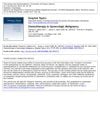 1 citations,
April 2021 in “Deneysel ve klinik tıp dergisi/Journal of experimental and clinical medicine”
1 citations,
April 2021 in “Deneysel ve klinik tıp dergisi/Journal of experimental and clinical medicine” Women with PCOS have a higher risk of metabolic syndrome and need lifestyle changes and treatment.
 August 2024 in “Research Square (Research Square)”
August 2024 in “Research Square (Research Square)” Using 5-alpha reductase inhibitors may lower the risk of breast cancer in females.
 March 2024 in “Biomedical reports”
March 2024 in “Biomedical reports” Isoflavone may help manage PCOS symptoms, but its effectiveness is uncertain.
 August 2023 in “International Journal For Multidisciplinary Research”
August 2023 in “International Journal For Multidisciplinary Research” Ayurvedic treatment, exercise, and a healthy diet can effectively manage PCOD symptoms.
 June 2023 in “Journal of multidisciplinary sciences”
June 2023 in “Journal of multidisciplinary sciences” PCOS may increase the risk of certain cancers.
 December 2022 in “The Indian journal of chest diseases & allied sciences”
December 2022 in “The Indian journal of chest diseases & allied sciences” Women with PCOS often have sleep problems, including sleep apnea, which are linked to obesity and depression.

PCOS is a complex condition that can lead to serious health issues, but early diagnosis and treatment can reduce these risks.
 October 2022 in “Journal of Pediatric and Adolescent Gynecology”
October 2022 in “Journal of Pediatric and Adolescent Gynecology” A special blood test helped find the overactive ovary in a teen with PCOS, and removing that ovary improved her condition.
 July 2022 in “International journal of medical science and clinical invention”
July 2022 in “International journal of medical science and clinical invention” Women with irregular periods should be checked for PCOS and treated early to prevent complications, with birth control pills helping to manage symptoms.
 February 2022 in “Mediators of Inflammation”
February 2022 in “Mediators of Inflammation” Women with Polycystic Ovary Syndrome (PCOS) have lower levels of a substance called DIAPH1 in their blood, which is linked to changes in sugar metabolism and insulin resistance.
 April 2021 in “Journal of evolution of medical and dental sciences”
April 2021 in “Journal of evolution of medical and dental sciences” Women with PCOS have higher levels of certain androgens, which are good at predicting excess hair growth.
November 2020 in “AACE clinical case reports” A woman's severe male hormone excess was caused by a small, hard-to-find ovarian tumor.
 February 2020 in “Acta Scientific Women's Health”
February 2020 in “Acta Scientific Women's Health” PCOS is a common condition in women that can lead to infertility and other health issues, and it's diagnosed by specific criteria with various treatment options available.
 November 2018 in “International Journal of Current Pharmaceutical Research”
November 2018 in “International Journal of Current Pharmaceutical Research” PCOS is a hormonal disorder causing symptoms like irregular periods and acne, and increases the risk of diabetes and heart disease.

The conclusion is that a more comprehensive and precise approach is needed for diagnosing PCOS to address its broader health risks.

The document concludes that hair loss in women is complex, often linked to aging, health conditions, and nutritional deficiencies, and emotional impacts should not be underestimated.
 July 2015 in “Cambridge University Press eBooks”
July 2015 in “Cambridge University Press eBooks” The document concludes that careful history and physical exams are crucial for accurately diagnosing polycystic ovary syndrome and distinguishing it from other similar conditions.
 September 2008 in “Fertility and Sterility”
September 2008 in “Fertility and Sterility” Exposure to fatty acids significantly increased androgen levels in female dogs, suggesting a link to conditions like insulin resistance and PCOS.
 March 1965 in “Hospital Topics”
March 1965 in “Hospital Topics” Chemotherapy provides symptom relief and extends life in 30-50% of gynecological cancer cases, but has only cured choriocarcinoma.
 November 2021 in “Journal of The American Academy of Dermatology”
November 2021 in “Journal of The American Academy of Dermatology” Different stages and types of female hair loss are linked with age, menopause, high blood pressure, and skin conditions like acne and hirsutism.
 991 citations,
January 2011 in “Nature Reviews Endocrinology”
991 citations,
January 2011 in “Nature Reviews Endocrinology” The document concludes that PCOS is a complex disorder caused by both genetic and environmental factors, affecting women's health in various ways, and requires personalized treatment.
 815 citations,
April 2010 in “The Journal of Clinical Endocrinology & Metabolism”
815 citations,
April 2010 in “The Journal of Clinical Endocrinology & Metabolism” Women with PCOS should be screened for heart disease risk and manage their health to prevent it.
 162 citations,
April 2016 in “The Lancet Diabetes & Endocrinology”
162 citations,
April 2016 in “The Lancet Diabetes & Endocrinology” Testosterone therapy in transgender men has both desired effects like increased muscle mass and potential health risks such as higher cardiovascular risk.
 97 citations,
February 2007 in “Clinical Obstetrics and Gynecology”
97 citations,
February 2007 in “Clinical Obstetrics and Gynecology” The definition of Polycystic Ovary Syndrome may change with new research, and careful screening is key for managing the condition.
 96 citations,
February 2007 in “The Journal of Clinical Endocrinology & Metabolism”
96 citations,
February 2007 in “The Journal of Clinical Endocrinology & Metabolism” Women with type 1 diabetes often have polycystic ovary syndrome and excess male hormones, which are frequently undiagnosed.
 88 citations,
May 2012 in “Human Reproduction Update”
88 citations,
May 2012 in “Human Reproduction Update” Women with PCOS may take longer to get pregnant but can have a normal family size, and should manage their overall health to reduce long-term health risks.
 58 citations,
October 2001 in “Dermatologic Clinics”
58 citations,
October 2001 in “Dermatologic Clinics” Hair loss can indicate underlying systemic diseases and addressing these can sometimes reverse the hair loss.
 30 citations,
July 2019 in “Endocrinology”
30 citations,
July 2019 in “Endocrinology” Certain HSD3B1 gene types are linked to worse prostate cancer outcomes and affect treatment response and other health conditions.
 30 citations,
April 2014 in “Seminars in Reproductive Medicine”
30 citations,
April 2014 in “Seminars in Reproductive Medicine” Diagnosing PCOS in teenagers is hard because its symptoms often look like normal puberty, and there's a need for better diagnosis methods and agreement on criteria.
 16 citations,
September 2018 in “Clinical Biochemistry”
16 citations,
September 2018 in “Clinical Biochemistry” The document concludes that more research is needed to fully understand the causes of PCOS.





























